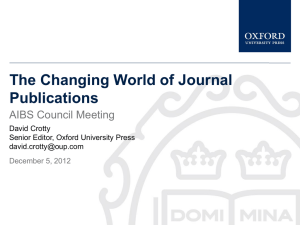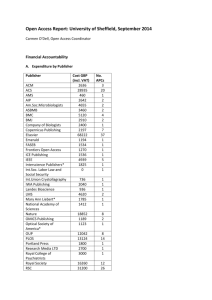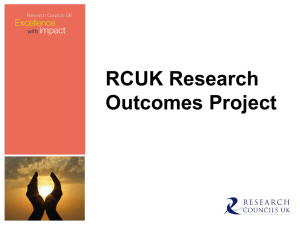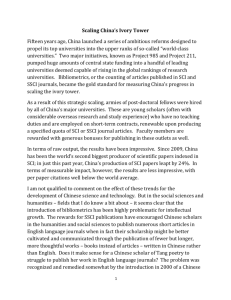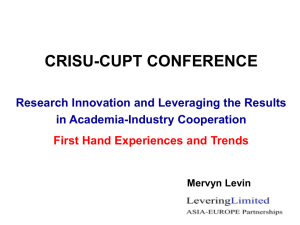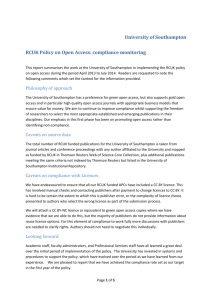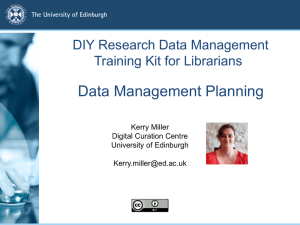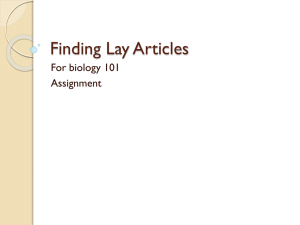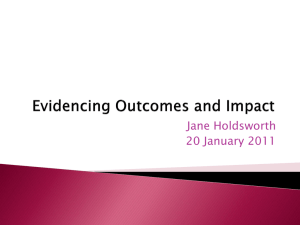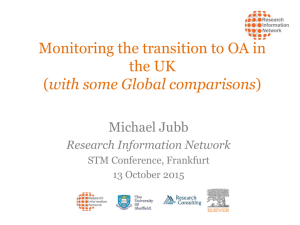Michael jubb presentation
advertisement
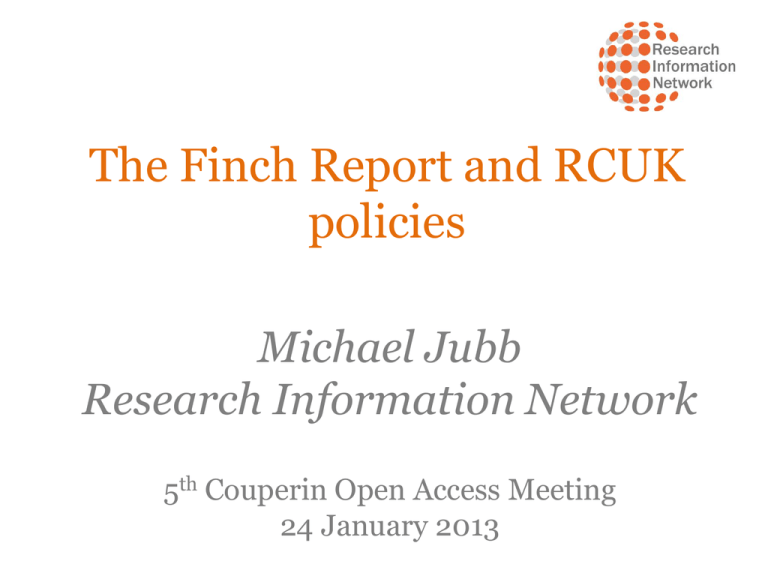
The Finch Report and RCUK policies Michael Jubb Research Information Network 5th Couperin Open Access Meeting 24 January 2013 The Political Context innovation transparency returns on investment a key principle ‘the results of research that has been publicly funded should be freely accessible in the public domain’ Some related developments Review of Intellectual Property and Growth (‘Hargreaves Report’) Royal Society report on Science as an Open Enterprise orphan works text mining intelligent access Open Data White Paper Research Transparency Sector Board Justice Committee Post Legislative Scrutiny of FOI Act Administrative Data Task Force EU Commission Communication: towards better access to scientific information Recommendation on access to and preservation of scientific information Amendments to public sector information directive The Question and the Process how to expand access, in a sustainable way, to peer-reviewed research publications group of 13 representatives of universities, libraries, funders, learned societies, publishers different groups with different interests no perfect solution: ‘best-fit’ The Global Picture 2m. research publications a year increasing at c.4% a year 25k scholarly journals most subscription-based 8k open access growth of hybrid journals commercial publishers and learned societies Scholarly Communications and the UK Research Community 120k publications in 2010 strong competitive position 13% humanities, social science & business 45% life sciences and medicine 42% physical sciences and engineering more articles and more citations per researcher and per £ spent more usage per article published citation impact and share of highly-cited papers second only to US factors underpinning this success Monographs library expenditure on monographs declining in real terms, while expenditure on serials is increasing rising prices and declining print runs no clear open access business model as yet, but some experiments OAPEN-UK project (http://oapen-uk.jiscebooks.org/) Mechanisms and Success Criteria more UK articles available globally more global articles available in the UK sustain high-quality research sustain high-quality services to authors and readers financial health of publishing and learned societies costs to HE and funders open access journals repositories licence extensions Conclusions no single mechanism meets all the success criteria a mixed economy transition to OA should be accelerated in an ordered way tensions between interests of key stakeholders, and risks to all of them costs global environment promote innovation and sustain what is valuable Recommendations clear policy direction towards Gold open access better funding arrangements, focusing responsibilities in universities, not funders minimise restrictions on use and re-use expand and rationalise licensing HE and NHS SMEs, public libraries deal with subscriptions and APCs in a single negotiation experiment with OA monographs develop repository infrastructure caution about embargoes Some responses Govt acceptance of recommendations £10m one-off funding RCUK policy announcement requirement for Gold + CC-BY (preferred), or Green with 6month embargo (12 months for humanities and social sciences) consultation on REF 2020 awaited universities establishing publication funds and policies BUT no co-ordinated implementation process Research Councils UK (RCUK) policies requirement from 1 April 2013 for block grant to universities to meet costs of article processing charges (APCs) assumes c45% of articles from Research Council-funded projects will be published in Gold OA journals in 2013-14, rising to 75% by 2017-18 some discussions continuing on issues including scope of papers covered, embargo periods, and CC-BY licences management of publication process put firmly in hands of universities Gold with a CC-BY licence (preferred), or Green with 6 months maximum embargo (12 months for humanities and social sciences) reporting and monitoring arrangements research data? Conclusion: some implementation issues development of Green repository infrastructure development of Gold infrastructure performance indicators? university policies and procedures arrangements for payment of APCs monitoring and evaluation of progress metadata standards and interoperability mandates, compliance, performance management…. implications of REF 2020 research data? Thank you Questions? Michael Jubb www.researchinfonet.org
